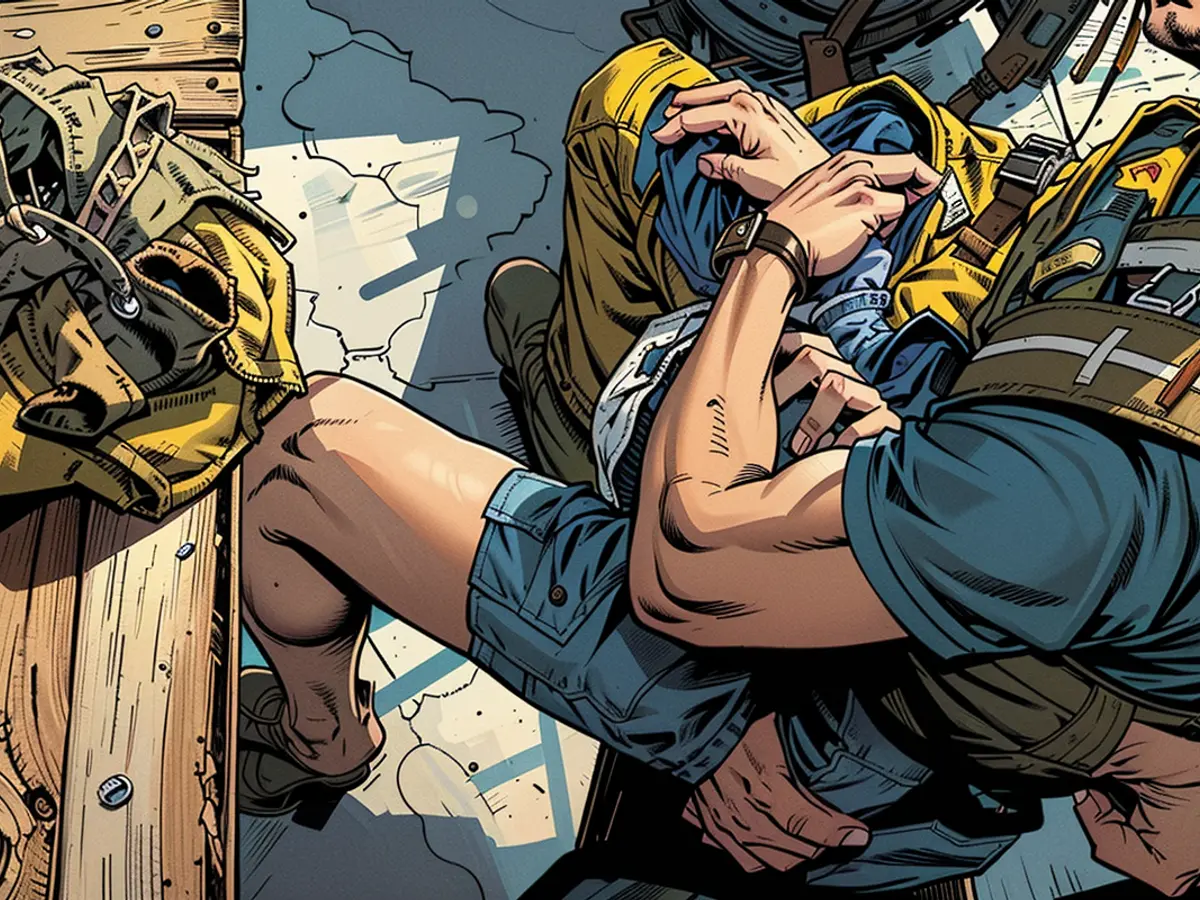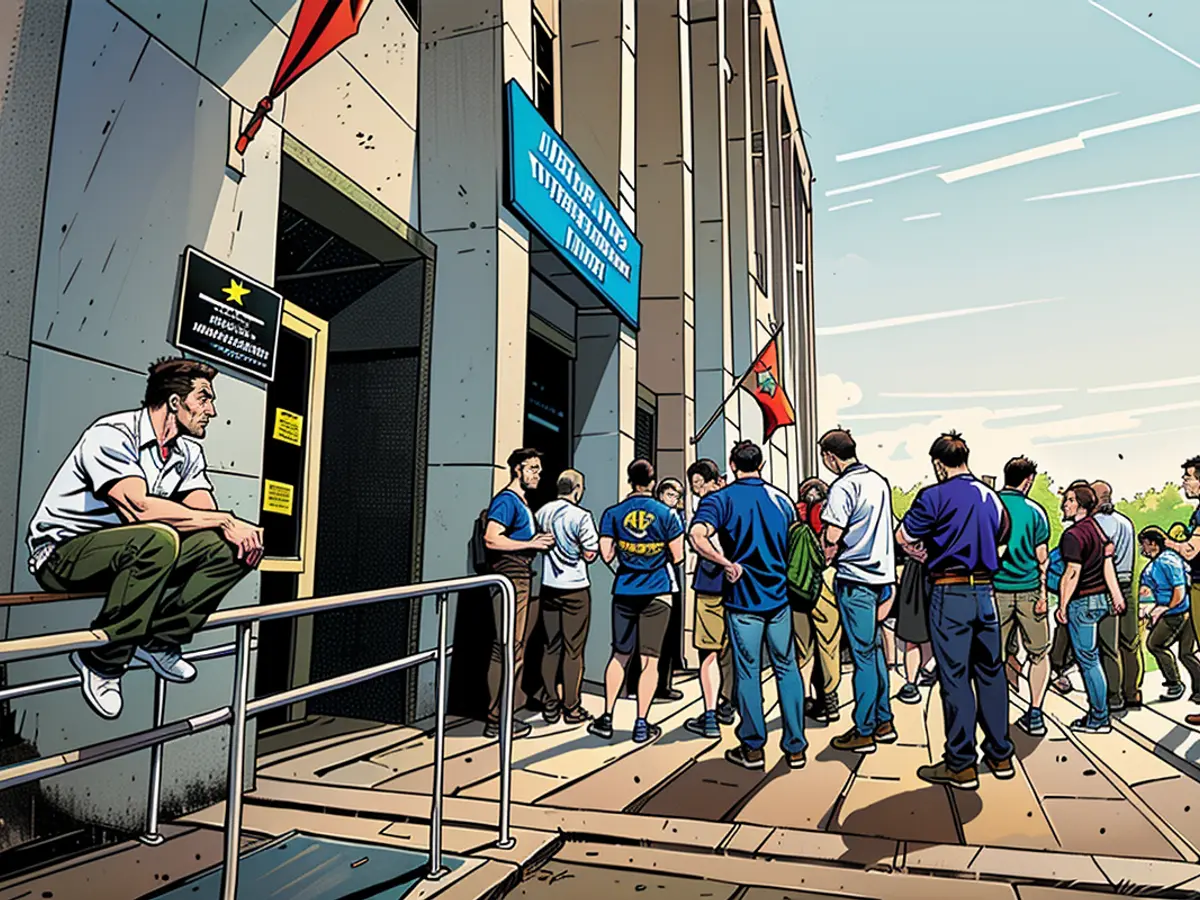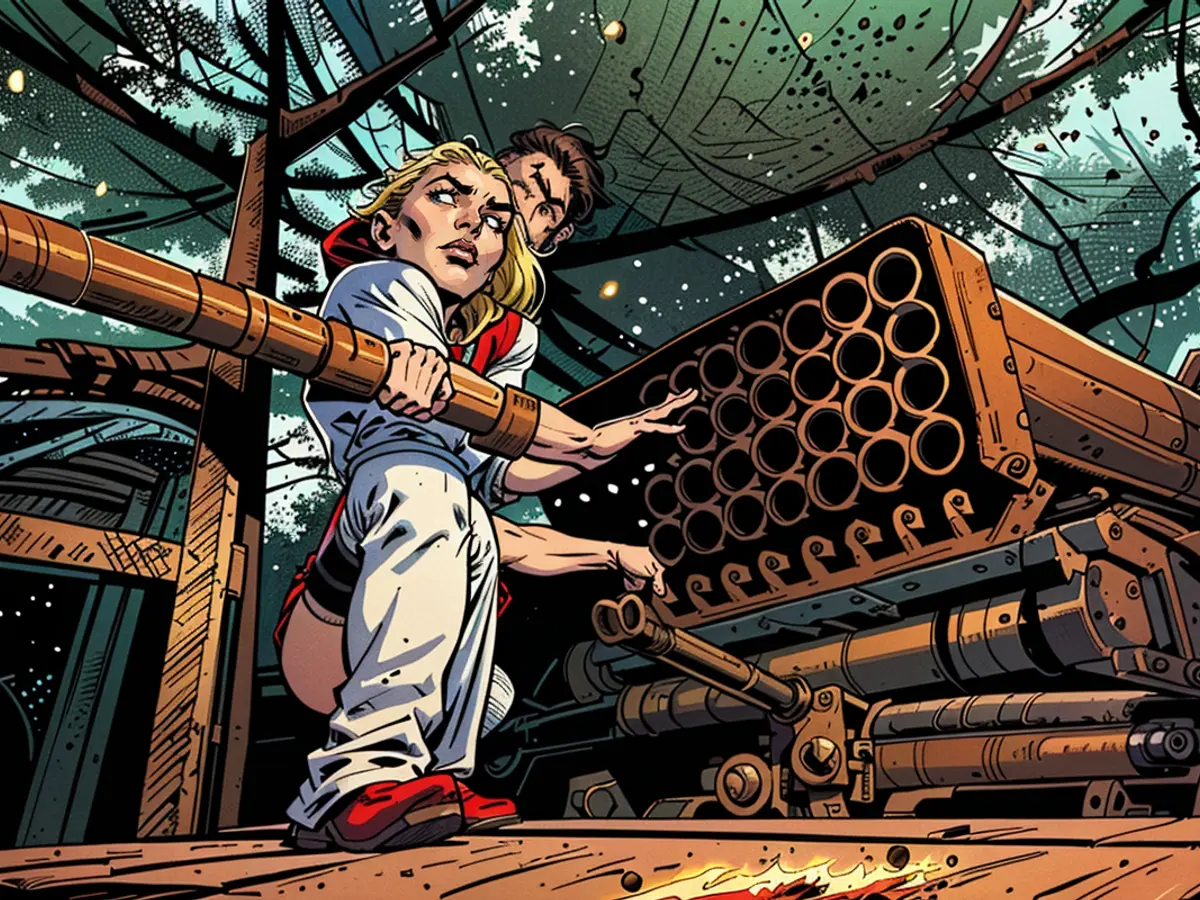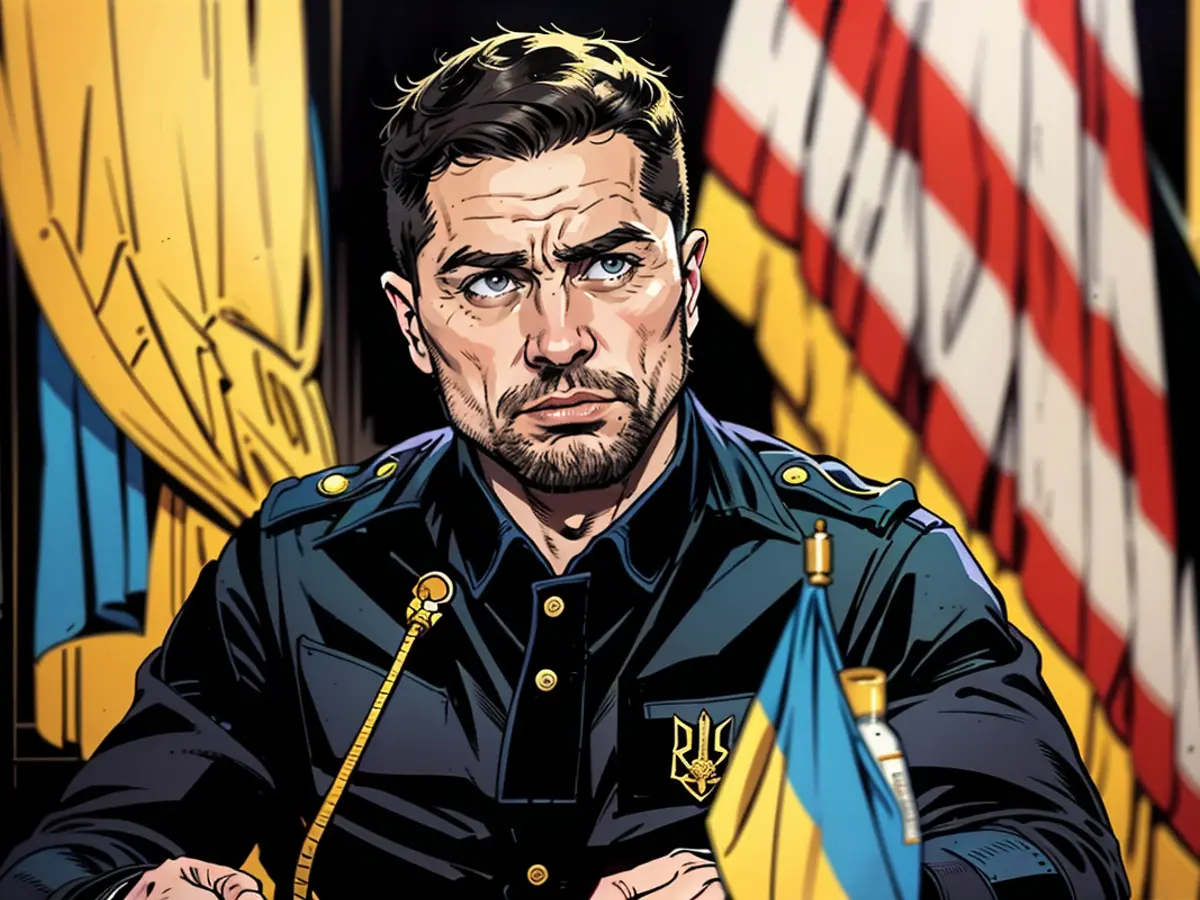Overpowered and understaffed, Ukraine's armed forces are grappling with diminished morale and an increase in absentees.
As a battalion leader, Dima managed around 800 soldiers who engaged in some of the most intense, violent battles during the war – most recently near Pokrovsk, the strategically significant eastern town that's now on the brink of falling to Russia.
However, with the majority of his troops either dead or severely injured, Dima decided he'd had enough. He left his position and joined the military once more, this time working from an office in Kyiv.
Outside that office, Dima smoked cigarettes and drank sweet coffee, telling CNN that he couldn't bear the sight of his men dying any longer.
Two and a half years of Russia's persistent onslaught have brought devastation to many Ukrainian units. Reinforcements are sparse, leaving some troops exhausted and disheartened. The situation is particularly dire among infantry units near Pokrovsk and other points along the eastern front line, where Ukraine is struggling to stop Russia's relentless progress.
CNN spoke to six commanders and officers who were either currently fighting or had recently overseen units in the area. All six confirmed that desertion and disobedience are becoming common issues, especially among new recruits.
Four of the six requested anonymity due to the sensitive nature of the topic and the fact that they weren't authorized to speak with the media.
One unit commander currently stationed in Pokrovsk told CNN, "Not all mobilized soldiers remain in their positions, but the majority leave. When new guys arrive, they see how difficult it is. They see a lot of enemy drones, artillery, and mortars." He also asked to remain unidentified.
"They go to the positions once and if they survive, they never return. They either abandon their positions, refuse to go into battle, or try to find a way to leave the army," he added.
Unlike the volunteers from earlier in the war, many of the new recruits didn't have a choice in joining the conflict. They were enlisted after Ukraine's new mobilization law went into effect in the spring and can't leave legally until demobilization is introduced, unless they get special permission.
However, discipline issues predating this time are evident. Ukraine faced a particularly challenging time during the winter and spring of last year. Delays in getting US military aid into the country resulted in a critical ammunition shortage, leading to a drop in morale.
Several soldiers told CNN at the time that they often found themselves in advantageous positions, with a clear view of the approaching enemy and no ammunition to fire. Some felt responsible for not providing adequate cover for their infantry units.
"The days are long, they live in a dugout, and if they can't shoot, the Russians have the advantage, they hear them approaching, and they know that if they had fired, it wouldn't have happened," said Andryi Horetskyi, an officer with a Ukrainian military unit now fighting in Chasiv Yar, another eastern frontline hot spot.
Serhiy Tsehotskiy, an officer with the 59th Separate Motorized Infantry Brigade, told CNN that the unit rotates soldiers every three to four days to reduce burnout. But the increase in drone usage makes this dangerous, forcing soldiers to stay in place longer. "The record is 20 days," he said.
As the battlefield situation worsened, a growing number of troops started to give up. In just the first four months of 2024, prosecutors initiated criminal proceedings against nearly 19,000 soldiers who either deserted or abandoned their posts, according to the Ukrainian parliament. More than a million Ukrainians serve in the country's defense and security forces, although this number includes everyone, including those working in offices far from the front lines.

The high number of disciplinary issues is likely incomplete. Several commanders told CNN that many officers would not report desertion or unauthorized absences, hoping instead to persuade soldiers to return without punishment.
This approach became so common that Ukraine changed the law to decriminalize desertion and absenteeism if it occurred for the first time.
Horetskyi told CNN that this change made sense. "Threats will only make matters worse. A smart commander will delay or even avoid threats," he said.
Pokrovsk has become the focus of the fight for Ukraine's east. Russian forces have been moving towards the city for months, but their advances have picked up pace in recent weeks as Ukrainian defenses weaken.
‘Everything feels the same’
Russian President Vladimir Putin has made it clear his goal is to gain control over the entirety of Ukraine's Donetsk and Luhansk regions, and taking over Pokrovsk, a crucial military and supply hub, would be a significant step towards that objective.
It sits on a key road that links it to other military cities in the area and a railroad that connects it to Dnipro. The last major coking coal mine under Ukrainian control is also located just west of the city, supplying coke to produce steel – an essential wartime resource.
Ukrainian soldiers in the area paint a bleak picture of the situation. Kyiv's forces are outnumbered and outgunned, with some commanders estimating there are 10 Russian soldiers for every Ukrainian.
But they also appear to be facing problems of their own making.
A battalion leader in northern Donetsk claimed that his flank was recently vulnerable to Russian assaults after nearby troops abandoned their stations without informing him.
The numerous Ukrainian units sent to the eastern battlefields have resulted in communication difficulties, as reported by several lower-ranking soldiers who hailed from Pokrovsk.
One soldier mentioned that Ukrainian signal jammers could occasionally disrupt crucial communication and drone launches due to miscommunication between various brigades.
Sappers spoke with CNN near the frontier between Ukraine and Russia's Kursk district, where they had recently been moved after their deployment south of Pokrovsk.

Ukraine undertook an unexpected incursion into Kursk last month, taking Moscow by surprise and advancing nearly 30 kilometers (19 miles) into Russian territory.
Ukrainian officials, including President Volodymyr Zelensky, stated that one of the objectives of this operation was to prevent further attacks on northern Ukraine and demonstrate that, with adequate support, the Ukrainian military could counterattack and eventually win the war.
The operation also provided a significant morale boost to the weary nation, which had been on the defensive for most of the previous year and had suffered continual attacks, blackouts, and devastating losses.
However, the sappers were skeptical about the strategy. Having just finalized a mission over the border, they were relaxing outside a closed restaurant near the border, expecting their ride.
Smoking and trying to stay awake, they questioned why they had been sent to Kursk when the eastern battlefront was chaotic.
“It felt strange to enter Russia, since our duty was to defend our land and country, and now we are fighting on the enemy's territory,” one of them remarked. CNN did not reveal their identities since they were not authorized to speak with the media and due to the sensitive nature of their comments.
These four individuals had been fighting for over two and a half years, and their job was demanding. As sappers, they spent lengthy periods on the front lines, clearing minefields, establishing defenses, and executing controlled explosions. They could find themselves under attack, even before the first line of infantry, carrying around 88 pounds (40 kilograms) of equipment and four anti-tank mines, each weighing around 22 pounds (10 kilograms).
Speaking with CNN, they looked completely drained. They had no rest between their mission in Pokrovsk and the one in Kursk.
“It depends on each commander. Some units get rotations and time off, while others are constantly fighting, and the system is far from fair,” one soldier conceded. When asked if the Kursk advances had given them the same boost as the rest of the nation, they remained hesitant.
“After three years of this, war, everything feels the same,” one of the men told CNN.
“Poor strategy”
On Thursday, Ukraine's Chief Commander Oleksandr Syrskyi acknowledged that low morale was still an issue and asserted that boosting it was “a very important aspect” of his role.
He said that the Kursk operation had significantly improved both military and national morale.

He had been visiting the front lines regularly to communicate with the soldiers and help alleviate their discomfort, he continued.
“Understanding each other does not matter who I am talking to, whether it is an ordinary soldier, a rifleman, for example, or a brigade commander or a battalion commander... I am aware of all the issues faced by our soldiers, sailors, and officers. The front line is my life,” he stated.
Horetskyi – an officer trained to provide moral and psychological support to troops – was part of the strategy to enhance morale.
During his recent leave in Kyiv, Horetskyi told CNN that while his function had existed for a while, it primarily consisted of paperwork. Now, he spent much more time with his unit, ensuring they were not burning out. However, his assistance was not always appreciated, he said.
“They view me as a shrink who will make them undergo thousands of tests and then tell them they are sick, so I try to break down barriers,” he stated, adding that simple distractions could avert a downward spiral.
In the monotony of war, any break from the routine could be beneficial, he claimed. This could include a real shower, a haircut, or a swim in a lake. “It's such a minor thing, but it provides them with a brief break from their routine for half a day, making them feel happier, and they can then return to their posts a bit more relaxed,” Horetskyi stated.
Even experienced officers struggled with the east's current conditions.
Some, like Dima, were seeking relief from the battlefield. He claimed that his decision to leave the battlefield was primarily due to disagreements with his new commander.
This was becoming increasingly prevalent, several officers informed CNN.
Dima's battalion was dissolving, and he attributed the decline primarily to the government's unwillingness to recruit more individuals.
The battalion suffered significant losses during the previous year, fighting on numerous frontlines before being sent to Pokrovsk without any rest. Dima observed so many of his men dying and injured that he became numb.
Despite this, he informed CNN that he intended to return to the front lines, but would make one modification first.
“I've now decided to stop forming emotional attachments to individuals. It's a repulsive strategy, but it's the wisest choice,” he said.

In the midst of Russia's relentless attacks, the situation among infantry units near Pokrovsk and other points along the eastern front line is particularly dire. Desertion and disobedience are becoming common issues, especially among new recruits who were enlisted after Ukraine's new mobilization law went into effect.
The high number of disciplinary issues is likely incomplete, with many commanders choosing not to report desertion or unauthorized absences in order to persuade soldiers to return without punishment.







